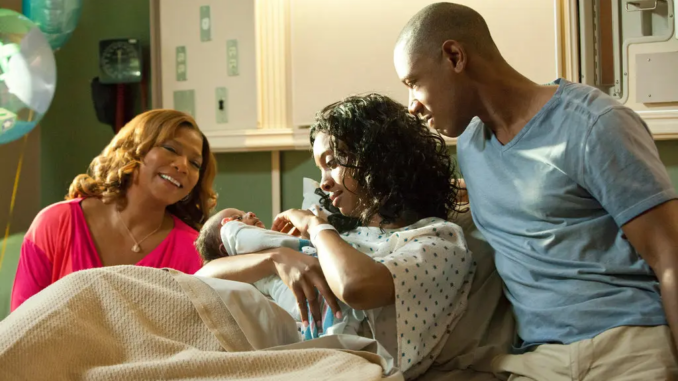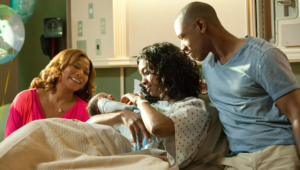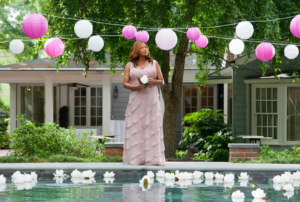
Trading Beauty Secrets and Barbs
When that thick slice of Southern ham called “Steel Magnolias” was released in 1989, not much was said about the fact that in a nearly two-hour film, set in a Louisiana town, only two black actors got to speak. Both played nurses, and between them they had about four lines. There were other black faces on screen — maids, banquet servers, token wedding guests — but they just smiled and kept their mouths shut.
It’s satisfying, then, to see how the new race-reversed Lifetime remake of “Steel Magnolias” on Sunday night turns the tables. White actors hover in the background, and few of them speak: a nurse, a couple of doctors and an ex-boyfriend. It’s hard to see why the doctors needed to be white, but let’s not quibble.
Unfortunately, in the only way that really counts, the new film is surprisingly, even slavishly, faithful to the original iron-plated tear-jerker, which Robert Harling wrote, based on his own play about six women who see one another through life’s ups and downs while gathering to gossip, joke and shed a tear at a local salon called Truvy’s Beauty Spot.

Sally Robinson has rearranged and condensed Mr. Harling’s story — the television version is a half-hour shorter — but has kept its important details and most of its “Attention: Cry Now” moments, as well as incorporating many of Mr. Harling’s Southern-fried one-liners verbatim. (“He’s so confused he don’t know whether to scratch his watch or wind his” rear end. “These thighs haven’t gone out of the house without Lycra on them since I was 14.”)
Queen Latifah as M’Lynn in the Lifetime TV movie “Steel Magnolias,” directed by Kenny Leon.Credit…Annette Brown/Lifetime, via Associated Press
The director Kenny Leon (“A Raisin in the Sun”) appears to have been aware of the synthetic schmaltziness of the material, and he and his all-star cast, which includes Alfre Woodard, Jill Scott, Queen Latifah and Phylicia Rashad, have worked hard to tone it down and smooth it out. William Ross’s music is much more subdued than Georges Delerue’s flowery score for the original. This “Steel Magnolias” is mostly restrained and relentlessly tasteful, qualities the original could not have been accused of.
But a tasteful “Steel Magnolias” misses the point. Very little happens in Mr. Harling’s story: aside from the gatherings at the salon, the films essentially consist of a wedding and a death, and everything else is banter and tears. Herbert Ross, a shamelessly effective director of big Hollywood entertainments, wisely pumped up the volume and the action in the original film to distract us from the script’s thinness. He also benefited from the shrewd casting of Sally Field, Olympia Dukakis and Shirley MacLaine, three expert purveyors of ersatz emotion and hollow laughs.
Mr. Leon’s highly talented cast doesn’t specialize in that kind of hucksterism, nor does anyone have the exaggerated vividness that Julia Roberts and Dolly Parton brought to the original. The actresses in the remake, even the normally fierce Ms. Woodard, give quiet, skillful performances in roles that barely exist, except as vehicles for wisecracks and outrageousness. They come across as prosperous New Jersey suburbanites rather than stereotypes of Southern eccentricity, which may sound like an improvement but just makes the whole project feel insubstantial.

Queen Latifah gets top billing as M’Lynn (the Sally Field role), the levelheaded mother of Shelby, whose marriage opens the film. Ms. Rashad brings her patrician tones to the Olympia Dukakis role (the busybody Clairee); Ms. Woodard steps in for Ms. MacLaine (the ornery Ouiser); and Ms. Scott takes the place of her fellow singer Ms. Parton (Truvy).
In the younger roles, Condola Rashad, Phylicia Rashad’s daughter, plays Shelby (Ms. Roberts in the original), and Adepero Oduye is the fledgling hairdresser Annelle (Daryl Hannah). The male roles matter even less in the remake than they did in the original; for some reason, the basketball superstar Julius Erving turns up in a cameo as a minister.
A number of details have been added or changed to reflect the new racial makeup and period, like a reference to Michelle Obama and a more organized style of dancing in the wedding scene. But someone still says, “Life goes on,” and Mr. Harling’s most artificial nugget of inspiration, “I would rather have 30 minutes of something wonderful than a lifetime of nothing special,” survives intact. Whether it’s recited by a white actress or a black actress, it’s still purple.
